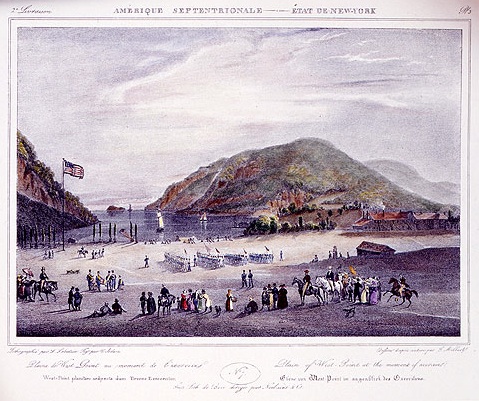Over the years, John Ward, ’64, has compiled a deep collection of West Point historical documents and memorabilia. Among them is The West Point Mutiny of 1818 and Its Aftermath:
This book tells the story of a group of five cadets, four in the class set to graduate in 1819 and one in that destined to graduate in 1821. They were distinguished by the fact that all were exemplary cadets – two were former Cadet Adjutants, one was a former Post Adjutant, three were former Cadet Colonels (a rank abolished earlier in 1818), two were Acting Assistant Professors of Mathematics, one was the senior of the two existing Company Commanders, and another had held that office. They were also remarkable for their distinguished backgrounds outside of West Point. One had been a commissioned officer and combat veteran at 15, before entering West Point at the age of 16. There, he had been entrusted with the mentoring of General Winfield Scott’s nephew. Another was the son of a colonel of the Regular Army in the War of 1812. Another was the grandson of the Lord Fairfax for whom George Washington had surveyed land. Another was a descendant of South Carolina gentry. And the last was the orphaned son of one of the authors of the Bill of Rights.
Their adventure began in November of 1818 when the Corps of Cadets became excited over the mounting record of brutality by the Commandant of Cadets, Captain John Bliss, who was wont to drag cadets out of formations, push them off railings, and throw stones at them. As had been the practice under the previous Superintendents, Captain Alden Partridge and General Joseph Swift, the Corps elected a committee to seek redress from the current Superintendent, Sylvanus Thayer. The Corps elected a committee of five members to ask for redress. These five cadets, all but one in their teens, were elected because they were leaders, had no dispute with the Commandant, and had exemplary records as cadets. Dutifully, they gathered evidence and presented the Corps of Cadets’ petition for redress to Major Thayer. Nothing could have prepared them for the outcome of their simple request to their commanding officer.
The book follows the roller coaster adventure and ordeal of the five for the next year and more – a time in which they found themselves facing the full power of the Army, the Secretary of War, the Cabinet, and the President. Dealing at times face to face with generals and the Secretary of War, they were arrested, exiled, and excluded from their studies. During this ordeal, they were ordered to trial first by a Court of Inquiry and then by a Court Martial. But their case was eventually considered and decided at the very highest levels – it was discussed at several cabinet meetings and an interim decision was rendered in the president’s own handwriting. Along the way, the top generals in the American Army – including a future president and a future presidential candidate – approved their actions and condemned the Superintendent, whose own conduct a Congressional Committee found not to be “altogether ‘satisfactory.’”
In the end, these five young men won a victory for their fellow cadets – but a Pyrrhic one for themselves – at the cost of their own nascent military careers. The book follows their later lives as lawyers, engineers, teacher, explorer, and cartographers (including one descendant who became Superintendent of the Naval Academy). It also traces the next decade of the history of the Military Academy, during which that institution suffered from several actual mutinies that involved shots fired at faculty, loaded and primed cannons aimed with lit fuses at the Superintendent’s quarters, a tactical officer’s sword struck from his hand, and a cadet – whose father was the Attorney General of the United States – leveling his musket at an officer, only to be dissuaded from shooting by a fellow cadet. Such later events make the “mutinous conduct” of the five Committee Members pale by comparison. But their legacy – that Captain Bliss was relieved and his conduct never repeated, and that Cadets are even today soldiers protected by military law – yet abides.
